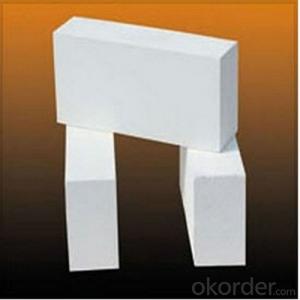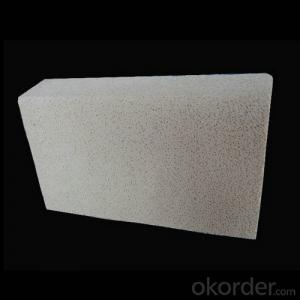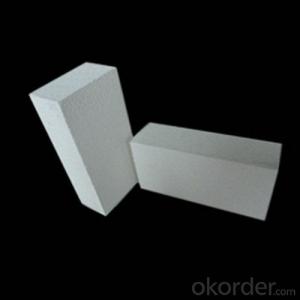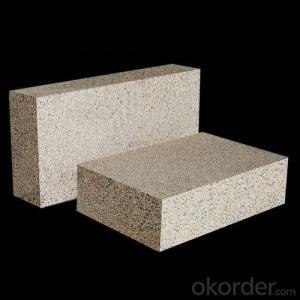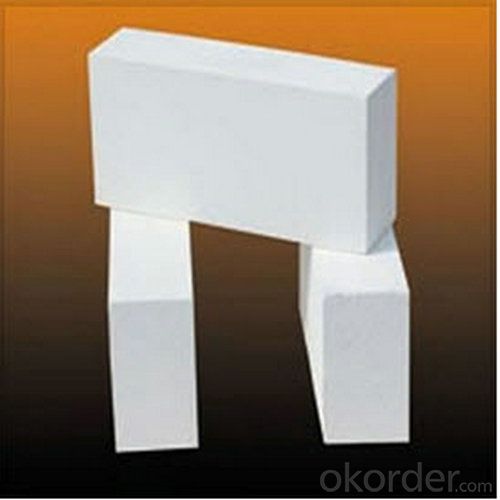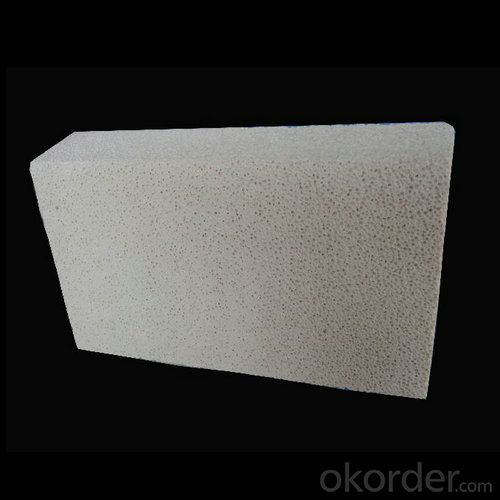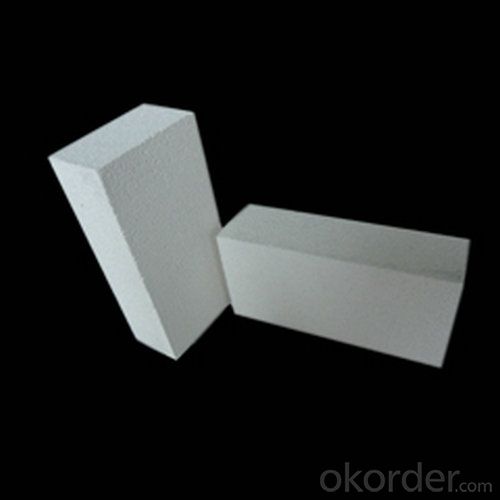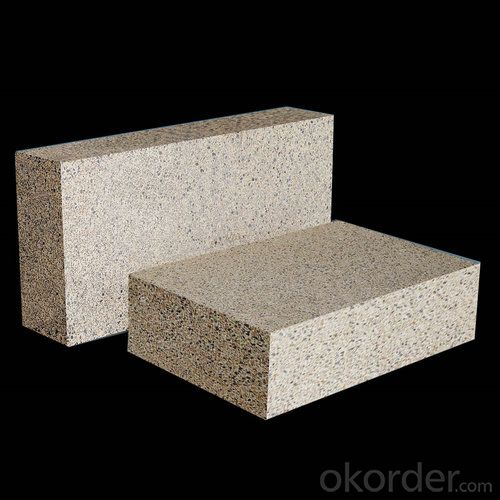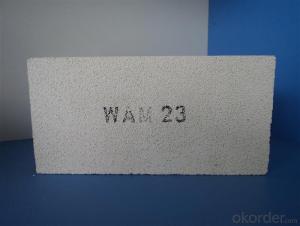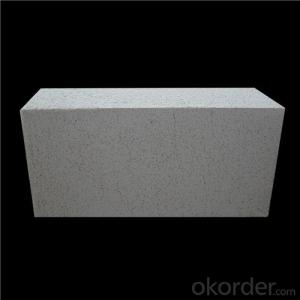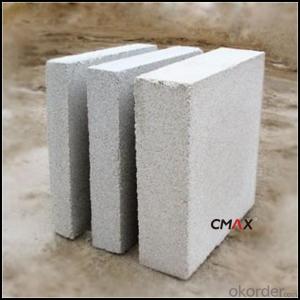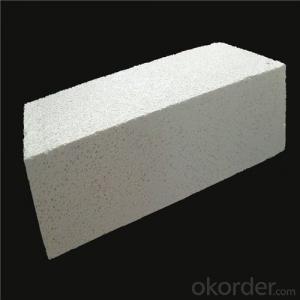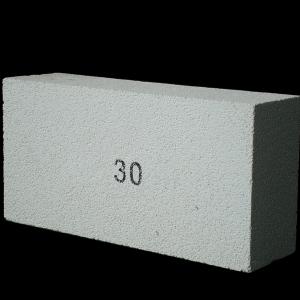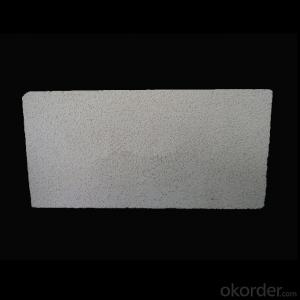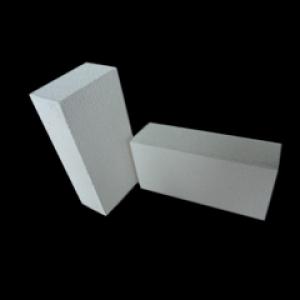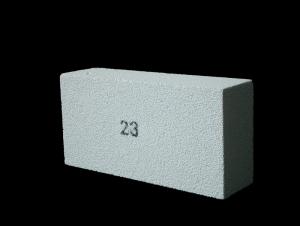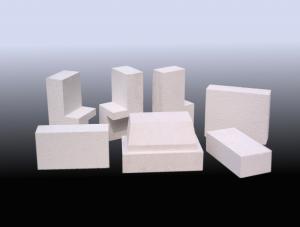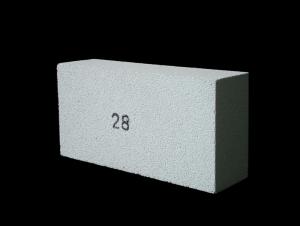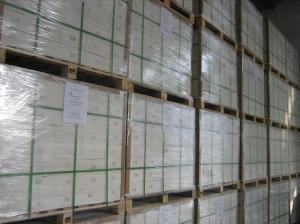High Thermal Shock Resistance Insulating Fire Brick
- Loading Port:
- Tianjin
- Payment Terms:
- TT OR LC
- Min Order Qty:
- 1 m.t.
- Supply Capability:
- 20000 m.t./month
OKorder Service Pledge
OKorder Financial Service
You Might Also Like
Description of Insulation Brick
CMAX Insulation Brick are classified under temperature between 1300℃ to 1700℃, manufactured from high purity alumina clay.
Features of Insulation Brick
Light weight and low thermal conductivity
Low heat storage
Low iron and impurities
High thermal shock resistance
Applications of Insulation Brick
CMAX Insulation Brick can be used as a hot face lining directly exposed to the heat or as a backup insulation layer in iron and steel mills, non-ferrous foundries, petrochemical, ceramic, glass.
Specifications of Insulation Brick
High Alumina Insulation Brick | ||||||
0.6 | 0.7 | 0.8 | 0.9 | 1.0 | 1.2 | |
Al2O3/% | ≥48 | ≥48 | ≥48 | ≥48 | ≥48 | ≥48 |
Fe2O3/% | ≤2 | ≤2 | ≤2 | ≤2 | ≤2 | ≤2 |
Bulk Density(g/cm3) | ≤0.6 | ≤0.7 | ≤0.8 | ≤0.9 | ≤1.0 | ≤1.2 |
Cold Crushing Strength Mpa | ≥2.0 | ≥2.5 | ≥2.9 | ≥3.4 | ≥3.9 | ≥5.00 |
Thermal Conductivity (350°C)W/m.K | ≤0.30 | ≤0.35 | ≤0.35 | ≤0.45 | ≤0.50 | ≤0.55 |
Reheating Linear Change less than 2.0% °C | 1350 | 1350 | 1400 | 1400 | 1400 | 1400 |
Images of Insulation Brick
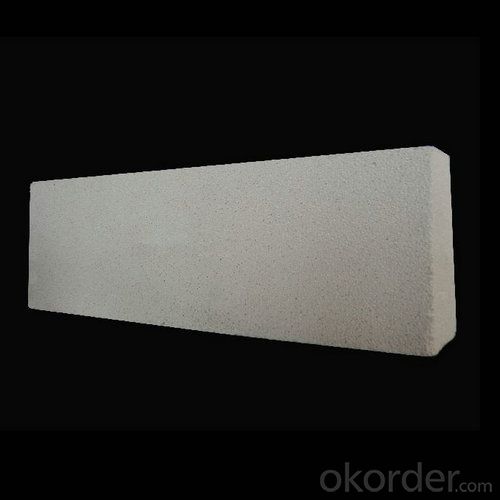
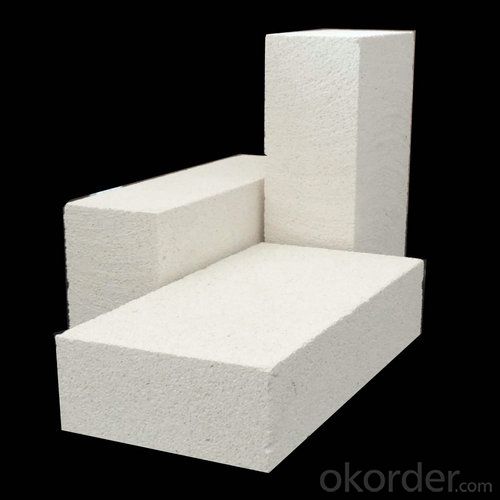
FAQ of Insulation Brick
1. Which products do you have?
We have all kinds of refractory brick, castable, mortar, cement, ceramic fiber products, etc.
Or you could browse our products to choose what you need.
2. Can you give me a general idea of the specification and technical data of your products?
CNBM offer a range of refractory and insulation products. We provide refractory bricks, monolithic refractories as well as ceramic fiber products. And On your given shapes, drawings or description, we are producing refractories with all sizes and shapes, resistant to temperature from 800 °C till 1800 °C, using various machines and equipments for cutting, grinding, drilling, polishing, shaping processes.
Every refractory product by CNBM is of superior quality. Lesser refractory products can not approach. CNBM utilizes proprietary testing methods, testing for chemical content, density, apparent porosity, cold crush strength and modulus of rapture. With stringent quality control, you can count on CNBM products to exceed refractory industry standards and your expectations.
3. Can you give me a brief introduction of the application of your products?
We are mainly specializing in the refractory materials in iron and steel, cement, glass, ceramics, petrochemical, electric power Industry, etc.
4. If I need your offer, what information do you need?
In order to choose suitable products, it will be appreciated to provide us the information, such us specification, technical data, order quantity, products application etc.
If any question, please contact us freely.
- Q: Can insulating fire bricks be used for insulation in heat recovery systems?
- Yes, insulating fire bricks can be used for insulation in heat recovery systems. Insulating fire bricks are specifically designed to withstand high temperatures and provide effective thermal insulation. They have low thermal conductivity, which means they can minimize heat loss and maximize heat recovery in a system. These bricks are often used in various industrial applications such as kilns, furnaces, and ovens, where temperature control and energy efficiency are important. Therefore, they can be a suitable choice for insulating heat recovery systems, helping to optimize the recovery and utilization of waste heat.
- Q: Do insulating fire bricks have low thermal conductivity?
- Yes, insulating fire bricks have low thermal conductivity. These bricks are specifically designed to minimize heat loss and provide excellent insulation properties. The low thermal conductivity of insulating fire bricks is due to their composition, which typically includes lightweight materials such as clay, silica, and alumina. These materials have low thermal conductivity, meaning they are not efficient at transferring heat. As a result, insulating fire bricks are highly effective at reducing heat transfer and maintaining high temperatures within a structure. This makes them ideal for applications that require insulation against high temperatures, such as in kilns, furnaces, and fireplaces.
- Q: Can insulating fire bricks be used in refractory castings?
- Yes, insulating fire bricks can be used in refractory castings. Insulating fire bricks are lightweight and have high insulating properties, making them suitable for applications that require thermal insulation. This includes refractory castings, which are used to create linings in furnaces, kilns, and other high-temperature equipment. The insulating fire bricks can be used as a layer or as a part of the refractory casting mix to provide thermal insulation and reduce heat loss. Additionally, their low thermal conductivity helps in minimizing energy consumption and maintaining high temperatures within the casting.
- Q: Can insulating fire bricks be used in electric furnaces?
- Yes, insulating fire bricks can be used in electric furnaces. Insulating fire bricks are designed to have low thermal conductivity, which makes them ideal for use in applications where heat needs to be contained or insulated. Electric furnaces require insulation to prevent heat loss and improve energy efficiency. Insulating fire bricks can withstand high temperatures and provide excellent insulation properties, making them suitable for use in electric furnaces. Additionally, they are lightweight and easy to install, making them a preferred choice for insulation in electric furnaces.
- Q: Are insulating fire bricks suitable for use in furnaces?
- Indeed, furnaces can indeed benefit from the utilization of insulating fire bricks. These exceptional bricks are meticulously crafted to endure extreme temperatures and deliver remarkable insulation capabilities. By employing lightweight materials with minimal thermal conductivity, they effectively retain heat and minimize energy dissipation within the furnace. Withstanding temperatures up to 3000°F (1650°C), these bricks are extensively employed in a range of furnaces, such as kilns, incinerators, and industrial furnaces. Their insulation properties significantly enhance energy efficiency and curtail fuel consumption, rendering them a preferred selection for furnace applications.
- Q: Difference between inorganic insulation material and organic thermal insulation material
- The main difference between inorganic insulation materials and organic thermal insulation materials is that the types of insulation materials are different:1, inorganic insulation materials, including glass wool, rock wool, expansion perlite, micro nano insulation board;2, organic insulation materials are mainly polyurethane foam, polystyrene board, phenolic foam and so on.
- Q: Can insulating fire bricks be used as a refractory lining material?
- Insulating fire bricks can indeed serve as a refractory lining material. Their purpose is to effectively insulate against heat transfer by having low thermal conductivity. This quality makes them suitable for applications that necessitate the maintenance or control of high temperatures, such as kilns, furnaces, and industrial ovens. High-temperature environments require refractory lining materials to safeguard their structure against the intense heat generated within. These materials must withstand thermal shocks, chemical reactions, and mechanical stresses that occur during operation. Insulating fire bricks are a prime choice for refractory lining applications due to their exceptional thermal insulation properties and high temperature resistance. In addition to being excellent insulators, insulating fire bricks have the added benefit of low density, making them lightweight and easy to handle and install. This advantage proves useful in applications where weight is a concern or where frequent replacement or repair of refractory linings is necessary. It is important to acknowledge that the specific type and composition of insulating fire bricks may vary, and different applications may require different properties. Therefore, it is vital to consult with a refractory engineer or supplier to guarantee that the chosen insulating fire bricks are appropriate for the specific requirements of the application.
- Q: Are insulating fire bricks suitable for use in glass furnaces?
- Yes, insulating fire bricks are indeed suitable for use in glass furnaces. These fire bricks are specifically designed to withstand high temperatures and provide excellent thermal insulation. They help to maintain consistent heat levels within the furnace, prevent heat loss, and reduce energy consumption. Additionally, insulating fire bricks are resistant to chemical reactions and can withstand the corrosive environment of a glass furnace.
- Q: Is it possible to repair damaged insulating fire bricks?
- Yes, it is possible to repair damaged insulating fire bricks. The extent and type of damage will determine the repair method required. For minor cracks or chips, a suitable refractory mortar can be used to fill in the gaps and restore the brick's integrity. This mortar is designed to withstand high temperatures and provide a strong bond. If a larger section of the brick is damaged or missing, it may be necessary to replace the entire brick. In this case, the damaged brick can be carefully removed and a new one can be installed using the appropriate refractory mortar. It is important to note that the repaired or replaced brick should match the original specifications and quality to ensure proper insulation and structural integrity. It is recommended to consult with a professional or follow the manufacturer's guidelines for the specific repair process.
- Q: Do insulating fire bricks require a specific curing or drying process before use?
- Yes, insulating fire bricks typically require a specific curing or drying process before use. This is done to remove any moisture or volatile organic compounds (VOCs) that may be present in the bricks, as well as to ensure they achieve their maximum insulating properties. The curing or drying process for insulating fire bricks usually involves slowly heating the bricks to gradually increase their temperature. This allows any moisture or VOCs to be released without causing any cracks or damage to the bricks. The rate of temperature increase and the overall duration of the curing process can vary depending on the type and thickness of the bricks. It is important to follow the manufacturer's instructions and recommendations for the specific type of insulating fire bricks being used. This will ensure that the curing or drying process is carried out correctly and that the bricks are ready for use in high-temperature applications such as kilns, furnaces, or fireplaces. Neglecting to properly cure or dry the bricks may result in reduced insulating properties and potential cracking or failure of the bricks when exposed to high temperatures.
Send your message to us
High Thermal Shock Resistance Insulating Fire Brick
- Loading Port:
- Tianjin
- Payment Terms:
- TT OR LC
- Min Order Qty:
- 1 m.t.
- Supply Capability:
- 20000 m.t./month
OKorder Service Pledge
OKorder Financial Service
Similar products
Hot products
Hot Searches
Related keywords
